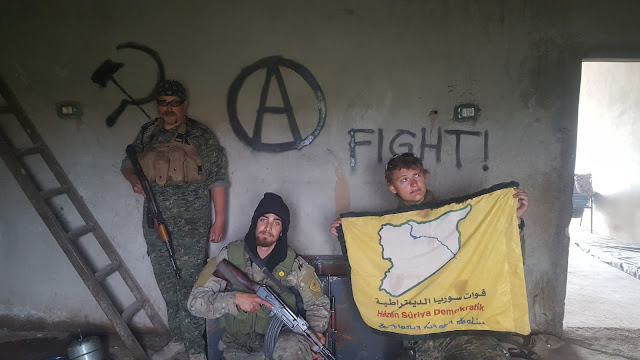Left to right, back to front: Myself, Martin Gruden (Shaheed Rudi Chekdar), Jordan Mactaggart (Shaheed Ciwan Firat), and Jordan Matson, in a house/staging area in Manbij. Half the guys in this photo didn't make it out alive. If anyone reading this knows how to get a hold of the family of Shaheed Rudi (Martin Gruden of Slovenia), Please contact me. If they would like to know, I can tell them about his last day. If they would like to be left alone, then Shaheed Namirin. I hope they find peace. (Photo Jordan Mactaggart Collection)
Lose your sense of humor in a grisly situation, and you'll lose it (Note the tag on the wall, upper right. It says "F.oreign A.ssault G.roup," because acronyms should denote the serious nature, of serious Fuckers, doing serious things.). Gallows humor best humor. This house was occupied by Tabor Yekbun, which Matson was attached to for a time. Ciwan, Rudi and myself were with another Tabor that helped them hold the building down for a while, as it was being used as a staging area for further pushes into the city. Friends and I later called it the "Yekbun Death House' because at least half the Tabor was Shaheed or injured here. There were many Death Houses in Manbij.
Before I carry on, and eventually finish the 'War is a Drug' Series, I want to talk about this. Losing People. Losing your friends, your Brothers and Sisters. It's intensely painful. I can't find the right words to describe the sensation of wrapping your newly Shaheed friend in a blanket. Words fail me. One quickly gets accustomed to the unattended bodies of enemies, of the smell of rotting flesh. Not so with dead comrades. When their gaze meets yours, it sticks with you. You can only hold their eyes shut and hope you did everything you could, but you will never feel like you did. You will wish you had stepped just a few feet forward and took the bullet for them. And I don't know how to express how this feels. A 2004 study of Vietnam Veterans experiencing PTSD found that: "In this study, we therefore, sought to demonstrate the prominence of combat-related grief-specific symptoms in a sample of Vietnam veterans being treated for PTSD. Our results indicated that indeed this sample of veterans reported high levels of grief-specific symptoms comparable to that found in bereaved individuals whose spouse had recently died..."
https://www.ncbi.nlm.nih.gov/pubmed/15474850
https://www.ncbi.nlm.nih.gov/pubmed/15474850
And this is a study of War Vets who lost their Comrades many years before. Think long and hard before you go off to war.
As part of the coming posts, I'll talk about the last days of three Shaheeds--Ciwan, Firaz, and Rudi. I know many, many Kurdish Shaheeds, but few that I was with in their last. Nevertheless, I'll still talk about some of my Kurdish Hevals who gave all in Manbij. Also, if you're looking for full, graphic descriptions of what happened in these guys last moments, look elsewhere. It's not necessary, and takes or adds nothing to who they were or what they did in life.
Lastly: I'm not a hero, and don't claim to be one. I'm literally some big thirty-something lurching Midwest dude who showed up in a war zone and did OK. I was able to respond effectively to most things that happened to me, except for one incident that left me temporarily incapacitated and combat ineffective. I'd also had training. In the following posts, I'll talk about people that WERE heroes. Who helped civilians under fire get to safety. Who despite being barely old enough to graduate high school, ran into danger to help the injured Hevals. I've done a few similar things, but because it was drilled into my head when I was younger. Many of these Heroes did it because it was what was in their heart--they couldn't help but be who they were in that situation.
Shaheed Ciwan, upon arriving to Rojava for his Second, and last tour, poses with the Shaheed Poster of his friend Reece Harding. Shaheed Namirin. Til Valhal. (Photo Jordan Mactaggart Collection)
The always tranquil Christian Cemetary in Tel Nasr. A good place to rest.
The Manbij Meatgrinder. (Photo Mactaggart collection)
Shaheed Ciwan, Shaheed Muslim by the morale fire prior to the Shadadee operation. Heval Muslim also Shaheed in Manbij. He was one of my favorite people in Tabor Shaheed Berxwedan.


Shaheeds Ciwan Firat and Agir Shervan, Jordan Mactaggart and Levi Shirley. Both were from Colorado--the mountains must breed bravery. Shaheed Namirin. Til Valhal.
Shaheed Firaz Kardo,
Badin al-Imam. Had truly been everywhere and done everything. Shaheed Namirin. Til Valhal.
Badin al-Imam. Had truly been everywhere and done everything. Shaheed Namirin. Til Valhal.
Rudy and Kemal display their personalities...
Shaheed Rudi Chekdar, Martin Gruden of Slovenia. Shaheed Namirin. Til Valhal. (Photo Freeman Stevenson)
Shaheed Givarra, Dean Carl Evans, of Britain. Shaheed Namirin. Til Valhal.
Shaheed Amed Kobane, William Savage, Shaheed in the last days of Manbij. Shaheed Namirin. Til Valhal.
These are the six internationals who gave their lives for the liberation of Manbij. As I said earlier, I'll only be talking about the three I was with at the end. Much attention is paid to the foreign fighters, but we were a tiny part of the operation. The city was taken by Kurds and Arabs. Many, many who gave their lives or who were injured past the point of future functioning. Remember them.
























